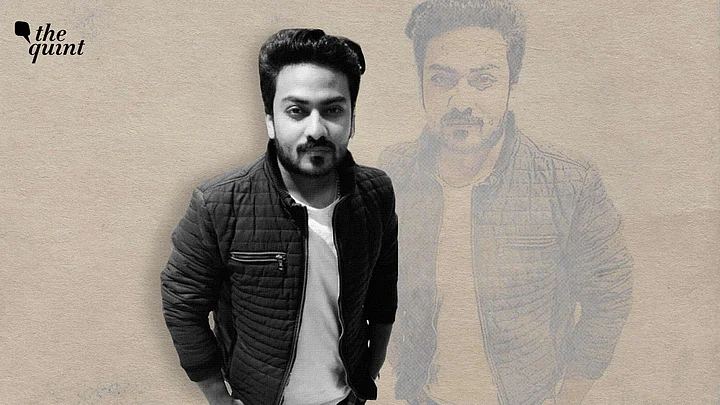Journalist Akhlad Khan, who worked as a stringer with The Times of India, passed away due to heart failure at Moradabad on Monday 11 April. He was just 28. Khan extensively covered hate crimes in Delhi, Uttar Pradesh, and other states and was closely tracking the cases related to the 2020 northeast Delhi communal violence.
If you take even a cursory look at his Twitter timeline, you would see that a vast majority of his tweets focussed on putting out information on communal violence and hate crimes.
His second-last tweet was to fellow journalist Alishan Jafri, about the effect that tracking this space could have on one's mental health. He tweeted:
Akhlad Went Out of His Way to Help People and Document Hate Crimes
I interacted with Akhlad a number of times, mostly regarding details of hate crimes and also for updates on the case against northeast Delhi violence accused Shahrukh Pathan, who happened to be Akhlad's relative.
My last telephone conversation with him was in the last week of January this year, when he called to seek advice just before joining as a stringer with The Times of India and international publication On the Ground News.
During our conversations, Akhlad mentioned very often that journalism, especially tracking hate crimes and communal violence cases, wasn't just a job for him.
"Insaf ke liye kar raha hun bhai (I'm doing it for justice)," he would say.
My colleague at The Quint, Meghnad Bose, also recalls that Akhlad often sent stories and inputs on hate crimes to different publications without asking for a fee.
Punjab-based journalist Kusum Arora remembers that Akhlad was active in getting assistance to people during the COVID-19 second wave and helped one of her acquaintances get admitted to a hospital in Delhi.
"Randomly, he (Akhlad Khan) responded to my tweets & got one of our friend's cousin in Delhi admitted to the hospital."Kusum Arora, journalist
Though based in west UP, Akhlad made it a point to reach out to families of hate crime victims in other states as well, so that "their voices get heard."
Journalists who worked with him on a day-to-day basis disclose that work-related stress may have taken a toll on his health.
The Pain of Muslim Journalists Tracking Anti-Muslim Hate Crimes
Akhlad was among the bravest, most idealistic, and passionate journalists I have ever interacted with.
His death needs to bring focus on what Muslim journalists in India, especially those tracking communalism, are going through at present.
Newsclick journalist Tarique Anwar wrote about the emotional and physiological cost of tracking hate crimes.
Following news of Akhlad's death, Tarique Anwar wrote on his Facebook wall:
"This atmosphere of hate and helplessness takes a mental toll on us. It stresses us up, causing anxiety.
I too had suffered a major heart attack last year while reporting on Rohingya refugee camp near Kalindikunj in southeast Delhi that was set on fire on June 13, 2021. Despite trying our best not to let it go deep in, we fail and get mentally tormented."
Akhlad's second-last tweet mentioned earlier was in response to a tweet by journalist Alishan Jafri, who said, "Went through almost 45 mins of the footage from Sitapur/Gujarat last night. You have watch mechanically with no emotion. You end up staying awake the whole night. This takes a serious toll on your f****ng mind. You get anxiety and zone out anytime. This is not the life I wanted [sic]."
Alishan is right. This is not the life that he, Tarique, or Akhlad should have had. The Muslim women targeted under Bulli Bai or Sulli Deals also shouldn't have had to go through this.
As it is, an average Muslim in today's India is forced to face hate online, and often, mobs, vigilantes, or bullies in real life. To add to that is the heartbreak of seeing school friends, neighbours, and colleagues suddenly becoming hostile.
A Muslim journalist covering communalism goes through all this and an added level of toxicity – they are forced to document the hate against themselves and cover the injustice and violence that other Muslims are being subjected to.
When you go through a hate speech full of venom on how Muslims should be killed or Muslim women raped, you have to "watch mechanically with no emotion," as Alishan says. This is despite knowing that all that venom is directed at you and could have real-life consequences for your family and community.
Imagine how triggering it might be for a victim of Sulli Deals, Bulli Bai, and numerous hate messages and rape threats online to then go and cover similar threats of violence unleashed on hijabi girls in Karnataka?
As a converted Muslim, I feel immense guilt at my privilege. My name may have saved me from a lot of abuse, threats, and bullying that other Muslims, including Muslim journalists, go through. I don't think this guilt will ever go.
It is deeply unfair that the burden of documenting hate and communalism is disproportionately falling on the shoulders of Muslim journalists, who are also victims of these processes.
But Akhlad Khan is gone, way too soon. Another victim of the communal toxicity around us, which is only increasing with each passing day. He died before the justice he was hoping for could be delivered in even one of the cases he was tracking closely.
May he find the peace and justice that he couldn't find in this world. Rest in peace, Akhlad.
(This is an opinion article and the views expressed are the author's own. The Quint neither endorses nor is responsible for them.)
